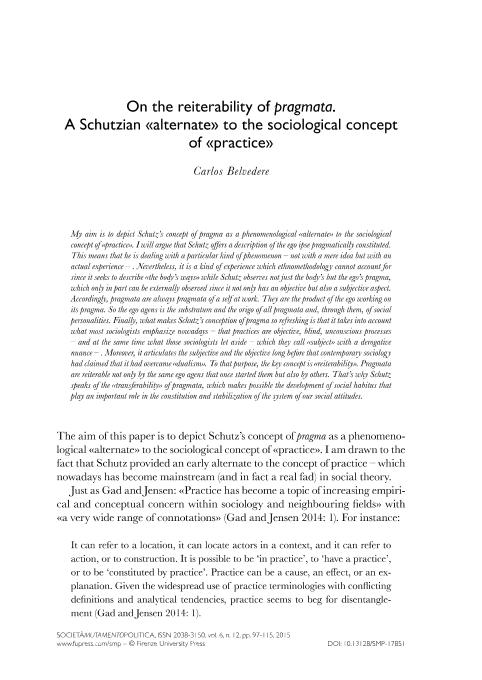Mostrar el registro sencillo del ítem
dc.contributor.author
Belvedere, Carlos Daniel

dc.date.available
2019-03-06T17:45:27Z
dc.date.issued
2015-12
dc.identifier.citation
Belvedere, Carlos Daniel; On the reiterability of pragmata : a Schutzian "alternate" to the sociological concept of "practice"; Firenze University Press; Società, Mutamento, Politica; 6; 12; 12-2015; 97-115
dc.identifier.issn
2038-3150
dc.identifier.uri
http://hdl.handle.net/11336/71068
dc.description.abstract
My aim is to depict Schutz’s concept of pragma as a phenomenological «alternate» to the sociological concept of «practice». I will argue that Schutz offers a description of the ego ipse pragmatically constituted. This means that he is dealing with a particular kind of phenomenon – not with a mere idea but with an actual experience – . Nevertheless, it is a kind of experience which ethnomethodology cannot account for since it seeks to describe «the body’s ways» while Schutz observes not just the body’s but the ego’s pragma, which only in part can be externally observed since it not only has an objective but also a subjective aspect. Accordingly, pragmata are always pragmata of a self at work. They are the product of the ego working on its pragma. So the ego agens is the substratum and the origo of all pragmata and, through them, of social personalities. Finally, what makes Schutz’s conception of pragma so refreshing is that it takes into account what most sociologists emphasize nowadays – that practices are objective, blind, unconscious processes – and at the same time what those sociologists let aside – which they call «subject» with a derogative nuance – . Moreover, it articulates the subjective and the objective long before that contemporary sociology had claimed that it had overcame «dualism». To that purpose, the key concept is «reiterability». Pragmata are reiterable not only by the same ego agens that once started them but also by others. That’s why Schutz speaks of the «transferability» of pragmata, which makes possible the development of social habitus that play an important role in the constitution and stabilization of the system of our social attitudes.
dc.format
application/pdf
dc.language.iso
eng
dc.publisher
Firenze University Press

dc.rights
info:eu-repo/semantics/openAccess
dc.rights.uri
https://creativecommons.org/licenses/by-nc-sa/2.5/ar/
dc.subject
Pragma
dc.subject
Practice
dc.subject
Reiterability
dc.subject
Habituality
dc.subject.classification
Sociología

dc.subject.classification
Sociología

dc.subject.classification
CIENCIAS SOCIALES

dc.title
On the reiterability of pragmata : a Schutzian "alternate" to the sociological concept of "practice"
dc.type
info:eu-repo/semantics/article
dc.type
info:ar-repo/semantics/artículo
dc.type
info:eu-repo/semantics/publishedVersion
dc.date.updated
2019-02-25T12:59:26Z
dc.journal.volume
6
dc.journal.number
12
dc.journal.pagination
97-115
dc.journal.pais
Italia

dc.description.fil
Fil: Belvedere, Carlos Daniel. Consejo Nacional de Investigaciones Científicas y Técnicas; Argentina
dc.journal.title
Società, Mutamento, Politica
dc.relation.alternativeid
info:eu-repo/semantics/altIdentifier/url/http://www.fupress.net/index.php/smp/article/view/17851
dc.relation.alternativeid
info:eu-repo/semantics/altIdentifier/doi/http://dx.doi.org/10.13128/SMP-17851
Archivos asociados
